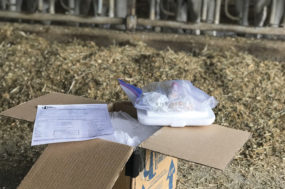- Dairy margins squeezed by COVID-19 impact
- PMMB maintains over-order premium at $1 per cwt
- April Class I base: $16.64 per cwt
- Global Dairy Trade prices mixed
- National Dairy Board nominees sought
- DFA plans improvements at plant in Zumbrota, Minnesota
- DOT emergency declaration relaxes hours-of-service regulations
- Dairy companies urged to self-certify as part of critical infrastructure
- California QIP ‘3.5 statute’ hearing postponed
- More dairy meetings canceled due to coronavirus concerns
Dairy margins squeezed by COVID-19 impact
Dairy margins deteriorated further over the first half of March as ongoing fallout from the coronavirus (COVID-19) outbreak continued to weigh on global dairy markets, according to Commodity & Ingredient Hedging LLC (CIH).
Social distancing measures enacted by both federal and local governments to stem the spread of the virus are causing significant anxiety as they negatively impact demand. The Class IV market in particular has come under extreme pressure with both butter and powder prices falling sharply. In addition to restaurants in many states being closed for dine-in service, school closures and work from home protocols enacted by several employers has had a profoundly negative impact on demand.
There are also supply concerns stemming from uncertainty over how milk processors may have to handle an outbreak of the virus among employees, with potential plant closures a distinct possibility.
On the supply side, the USDA reported February milk production and cow numbers higher. (Read: Leap day factors into milk production jump.)
According to CIH, milk production will likely expand further with spring flush beginning and mild weather conditions, adding to supply concerns.
On a positive note, corn prices have plummeted recently as severe margin pressure in the ethanol sector is causing many plants to idle or restrict production. However, soybean meal prices are firming in response to unrest in Argentina as producers react angrily to increased export taxes.
PMMB maintains over-order premium at $1 per cwt
Meeting in early march, the Pennsylvania Milk Marketing Board (PMMB) maintained the Class I over-order premium price for milk at $1 per hundredweight (cwt) and continued its formula for determining the fuel adjuster add-on. The pricing order will remain in effect through Sept. 30, 2020.
The over-order premium and the fuel adjuster add-on mandated by PMMB are paid on Class I (fluid) milk that is produced, processed and sold entirely within Pennsylvania.
April Class I base: $16.64 per cwt
The Federal Milk Marketing Order (FMMO) Class I base price continued to slide downhill. The April 2020 price is $16.64 per cwt, down 82 cents from March and $2.69 less than the latest peak in December 2019. It’s still 88 cents more than April 2019.
Through the first four months of 2020, the Class I base price average is $17.67 per cwt, $2.13 more than the same period a year ago and the highest first-quarter average since 2014.
Global Dairy Trade prices mixed
The index of Global Dairy Trade (GDT) dairy product prices declined in an auction held March 17. The overall index dropped 3.9%, with prices for major dairy products mixed:
- Skim milk powder was down 8.1% to $2,527 per metric ton (MT).
- Cheddar cheese was up 2.6% to $4,398 per MT.
- Butter was up 0.3% to $4,144 per MT.
- Whole milk powder was down 4.2% to $2,797 per MT.
The next GDT auction is April 7.
National Dairy Board nominees sought
The USDA is seeking candidates to serve on the National Dairy Promotion and Research Board (NDB). Newly appointed members will serve three-year terms beginning Nov. 1, 2020, through Oct. 31, 2023.
The USDA will accept nominations for board positions representing 10 geographic regions and one importer position. Nominees for the regional positions must be dairy producers and nominees for the importer position must be a dairy importer.
The geographic regions with vacancies are: Region 1 (Alaska, Oregon and Washington), Region 3 (Arizona, Colorado, Montana, Nevada, Utah and Wyoming), Region 4 (Arkansas, Kansas, New Mexico, Oklahoma and Texas), Region 5 (Minnesota, North Dakota and South Dakota), Region 6 (Wisconsin), Region 7 (Illinois, Iowa, Missouri and Nebraska), Region 8 (Idaho), Region 9 (Indiana, Michigan, Ohio and West Virginia), Region 10 (Alabama, District of Columbia, Florida, Georgia, Kentucky, Louisiana, Mississippi, North Carolina, Puerto Rico, South Carolina, Tennessee and Virginia), Region 12 (Connecticut, Maine, Massachusetts, New Hampshire, New York, Rhode Island and Vermont) and an importer.
The deadline for nominations is April 17. For nominating forms and information, visit the AMS website, or call (202) 720-1069.
To nominate an individual, submit a copy of the nomination form and a signed background form for each nominee to: Jill Hoover, Deputy Director, Promotion, Research and Planning Division, Dairy Program, Agricultural Marketing Service, USDA, 1400 Independence Ave. SW, Stop 0233, Room 2958-S, Washington, D.C., 20250-0233, or via email.
DFA plans improvements at plant in Zumbrota, Minnesota
Dairy Farmers of America Inc. (DFA) announced planned improvements to its cheese and dairy powders manufacturing facility in Zumbrota, Minnesota. Construction is scheduled to begin this summer.
Among the improvements is a new cheese and specialty powder dryer, scheduled to be completed in 2022. Also in the plans are a new wastewater pretreatment facility and a new building to be used for locker rooms, breakrooms, offices and other employee working and welfare space.
“These improvements will not only help us increase efficiency and enhance our employees’ work environment, but they will also upgrade our capabilities to allow us to better serve our customers for the long term,” said Terry Johnson, the facility’s new plant manager.
DOT emergency declaration relaxes hours-of-service regulations
In response to the COVID-19 outbreak, the U.S. Department of Transportation’s Federal Motor Carrier Safety Administration (FMCSA) has issued an expanded national emergency declaration, relaxing hours-of-service regulations for many commercial vehicle drivers.
The exemption from hours-of-service regulations extends until at least April 12. It covers those providing direct assistance supporting emergency relief efforts, including haulers of: food, paper products and other groceries; medical supplies and equipment related to the testing, diagnosis and treatment of COVID-19; supplies and equipment necessary for community safety such as masks, gloves, hand sanitizer, soap and disinfectants; and fuel.
Among those granted an exemption are haulers of livestock, according to the Livestock Marketing Association (LMA).
A complete list of those exempt from the hours-of-service regulations are included in the emergency declaration.
The expanded declaration stipulates that direct assistance does not include routine commercial deliveries. To ensure continued safety on the nation’s roadways, the emergency declaration stipulates that once a driver has completed his or her delivery, the drive must receive a minimum of 10 hours off duty if transporting property and eight hours if transporting passengers.
Dairy companies urged to self-certify as part of critical infrastructure
There’s another potential roadblock to delivering dairy products. The International Dairy Foods Association (IDFA) said it had received a handful of reports that local authorities in at least two states have stopped trucks carrying food products from entering or leaving COVID-19 quarantined zones, even though dairy is part of a larger declaration designating agriculture as a “critical industry.”
A U.S. Department of Homeland Security declaration encourages state and local authorities to allow farms and the entire food supply chain to continue operating as usual amid current and potential restrictions created to stem the spread of the virus.
The IDFA urged dairy companies to “self-certify” employees or product shipments as part of the nation's critical infrastructure. Click here to access a downloadable form from IDFA, which should be shown to authorities should they stop individuals or vehicles from carrying out their duties.
California QIP ‘3.5 statute’ hearing postponed
The California Department of Food and Agriculture (CDFA) postponed a public hearing on a petition related to the state’s Quota Implementation Plan (QIP). Originally set for April 7-8, no new date has been set.
The Stop QIP Dairy Tax Coalition filed the petition, calling for suspension of a section of the California Food and Agriculture Code (Chapter 3.5), which would effectively terminate the QIP, also called the Quota Administration Plan (QAP).
In its postponement notice, CDFA cited California Department of Health restrictions on public gatherings to protect public health and slow the spread of COVID-19.
In addition to the hearing on the petition, the date for a Stop QIP lawsuit has also been postponed, according to the United Dairy families of California. It was originally scheduled for May 15, but has been delayed until July 31.
More dairy meetings canceled due to coronavirus concerns
This is by no means a complete list, but here’s some of the larger dairy meetings and gatherings canceled due to COVID-19:
- The University of Minnesota Extension canceled all in-person programs statewide through March 31.
- The Central Plains Dairy Expo, scheduled for March 24-26, in Sioux Falls, South Dakota, has been canceled.
- The I-29 Moo University Dairy Beef Short Course, traditionally leading off the Central Plains Dairy Expo, will continue be held on Tuesday, March 24 from 10 a.m. to 3 p.m. (Central time) with a one-hour break from 12:30 to 1:30 p.m.
- The California Dairy Sustainability Summit, set for March 25-26, in Sacramento, California, has been postponed.
- The Wisconsin Farmers Union canceled the Dairyland Forum & Rally for Rural Wisconsin, which was set to draw presidential candidates and hundreds of family farmers and rural advocates to western Wisconsin on March 29.
- The Wisconsin Public Service Farm Show, scheduled for March 31-April 2, in Oshkosh, Wisconsin, has been canceled.
- An annual “Workshop for dairy economists and policy analysts,” originally set for April 22-23, in Baltimore, Maryland, will not be held.


-
Dave Natzke
- Editor
- Progressive Dairy
- Email Dave Natzke






